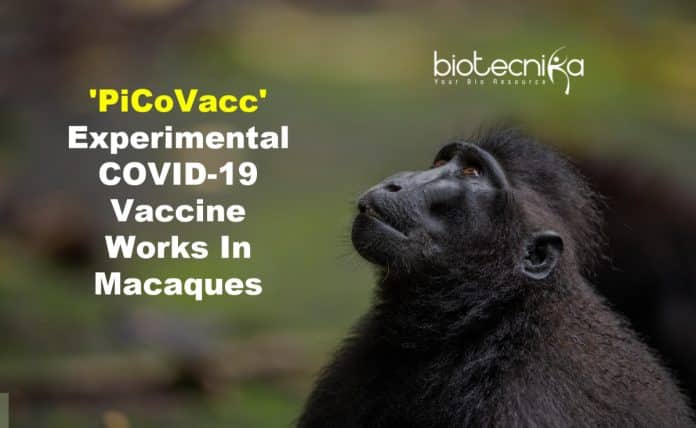‘PiCoVacc’ – Experimental coronavirus vaccine works in macaques as virus adapts to populations
In a current innovation, it was discovered that an experimental vaccine ‘PiCoVacc’ for the novel coronavirus in macaque monkeys safely induced antibodies that blocked a number of different strains of SARS-CoV-2. This research is published in the journal Science. The Chinese researchers state the human trial of their vaccine prospect, “PiCoVacc,” will likely begin later this year.
Some of the other recent clinical studies on the novel coronavirus and initiatives to discover therapies, as well as vaccines for COVID-19, are as follows:
The novel coronavirus is adapting to various populaces
Genetic evaluation of samples from more than 7,500 COVID-19 infected people shows that the new coronavirus spreads swiftly globally, it is adapting to its human hosts, as per the researchers reported in the medical journal Infection, Genetics, and Evolution. They discovered about 200 reoccurring genetic mutations of SARS-CoV-2 – which demonstrates how it might be evolving as it spreads in individuals.
Francois Balloux, Co-led the research, University College London, said “All viruses mutate naturally,” Francois Balloux of College University London, who co-led the research study, informed Reuters. “Mutations in themselves are not a bad thing and also
there is absolutely nothing to recommend SARS-CoV-2 is altering quicker or slower than anticipated. Until now, we can not claim whether SARS-CoV-2 is becoming more or less contagious and lethal”.Blood thinners may improve survival of hospitalized COVID-19 patients
A study from New York City suggests blood thinners may improve survival chances for hospitalized COVID-19 patients. The scientist looked back at 2,773 patients, about one in four of whom had received a high dosage of blood clot preventers. The researchers reported in the Journal of the American College of Cardiology that patients who got this therapy were most likely to endure. The difference was most pronounced among the 395 individuals who needed mechanical ventilation. In this group of people, the mortality rate without anticoagulants was 63% and with blood thinners, the mortality rate was 29%.
It can not prove that the drugs directly caused much better survival as the research was not randomized. Researchers claimed large randomized tests are needed to verify a benefit, and any prospective benefit requires to be weighed against the increased threat of hemorrhaging with these medicines.
COVID-19 antibodies might not predict speed of recuperation.
unpublished data suggest that the immune system does not constantly respond to SARS-CoV-2 infection the way doctors could anticipate. Researchers at MD Anderson Cancer Center, Houston discovered that having antibodies to 2 important frameworks on the virus surface does not always indicate patients’ recovery will be smoother or quicker.
“Patients with serious COVID-19 illness being treated in intensive care units had varying degrees of antibodies. In fact, some recouped people did not have these antibodies, which, suggests that their body immune systems fought off the virus by some unknown process. The research published on the preprint server medRxiv has not yet been peer-assessed or published in a medical journal,” said Dr. Raghu Kalluri, co-author of the study.
Coronavirus link to loss of odor and preference may be undervalued.
According to scientists who assessed 10 studies published earlier this year, the true prevalence of problems with smell and taste among patients infected with the COVID-19 may be greater than doctors expect. In a total of more than 1,600 infected people in the US, Canada, Asia, and Europe, almost 53% of people had showed reduced or loss of sense of smell. Nearly 44% of people faced problems with taste sense. The research team wrote in the journal of Otolaryngology-Head and Neck Surgery that in the subset of studies that used specifically reliable tests to assess patients’ capability to odor and also taste, and dysfunction rate was also higher, revealing “that real prevalence of the dysfunction in COVID-19 patients may remain underestimated”. Enhanced understanding “may encourage earlier diagnosis and therapy of COVID-19, along with increase alertness for the spread of the virus”.
Scientist list ways to ease stress of frontline caregivers
According to scientists who reviewed loads of research studies of the healthcare team working during outbreaks of arising viruses, there are lots of well-documented methods healthcare facilities could make use of to help ease frontline caregivers’ psychological stress. Generally, they say, treatments fall into the categories of clear interaction, access to ample individual protection, practical and psychological support, and also adequate rest.
Amongst their specific recommendations are changes to practice, including evaluating stations to funnel infected patients to specific locations, redesigning of procedures that pose high dangers for the spread of the virus, and minimizing the density of people onwards. They wrote in the BMJ that interventions revealed to be handy in the earlier research studies “were similar in spite of the variety of settings and types of outbreaks and therefore this could be relevant to the present COVID-19 episode“.






























